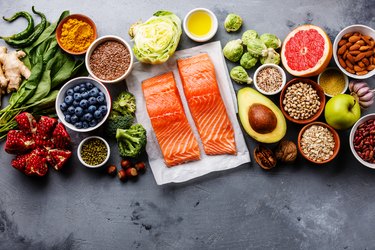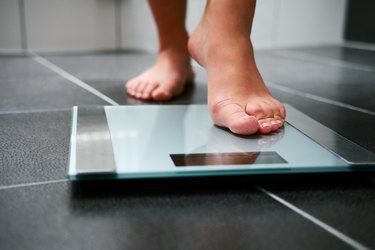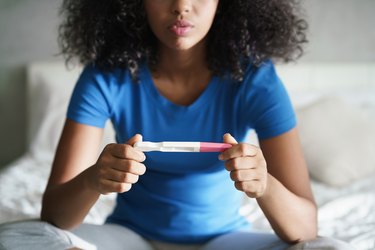
When you're trying to get pregnant and grow your family, you want to do everything in your power to create a positive environment. From tracking menstrual cycles to being mindful of how much we drink, women will often make changes as they prepare for a healthy pregnancy.
Some also adopt what's being touted as the fertility diet, which focuses on specific foods and is meant to increase the odds of conceiving. If you've got baby-making on the brain, here's what you need to know about this diet plan.
Video of the Day
Video of the Day
What Is a Fertility Diet?
Rather than a long laundry list of can- and can't-haves, a fertility diet is meant to clean up your eating habits to promote optimal health, and in turn, boost fertility. The diet was developed by three Harvard Medical School doctors and laid out in their 2009 book, aptly titled The Fertility Diet.
"The physicians developed this diet from the results of a long-term study following tens of thousands of women to track what those women ate and how often they achieved a pregnancy," Laurence Jacobs, MD, a board-certified OBGYN and reproductive endocrinologist with Fertility Centers of Illinois, tells LIVESTRONG.com.
According to Harvard Health Publishing, this eight-year study of over 18,000 women was the first comprehensive examination of diet and fertility. It resulted in 10 diet and exercise-based suggestions that seem to be linked to a woman's ability to conceive, including eating a variety of fruits, vegetables and plant proteins.

So, What Foods Can Help You Get Pregnant?
The good news about the fertility diet is that most women won't find it too restrictive if they already eat healthy-ish. That's because it follows many of the guiding principles of a clean, vibrant diet, including veggies, lean meats and other goodies.
Here are the main components:
1. Healthy Fats
Shun trans fats, found in fast foods as well as some packaged baked goods, coffee creamers and even frozen pizzas. Not only are these artificial fats bad for your heart, according to the U.S. Food & Drug Administration, but they have also been linked with increasing insulin resistance and disrupting ovulation, says Lucky Sekhon, MD, a reproductive endocrinologist and infertility specialist at Reproductive Medicine Associates of New York.
Conversely, Dr. Sekhon says choosing monounsaturated fats like those found in extra-virgin olive oil, nuts and avocados may improve the odds of conceiving.
You'll also want to opt for foods rich in omega-3 fatty acids. If you're a fan of salmon and mackerel, you could be improving your fertility chances already, since these wonders of the sea pack a bunch of omega-3s.
As Dr. Sekhon explains, fatty acids are used by the reproductive system as energy to fuel egg and early embryo development. She also notes they play a major role in embryo implantation and pregnancy maintenance. "Consistent omega-3 fatty acid intake has also been associated with more regular ovulation and lower rates of endometriosis," she adds.
Read more: 15 Healthy Fat-Rich Foods to Add to Your Diet
2. Fiber-Rich Foods
Fiber intake is beneficial for women who wish to become pregnant, since it decreases excess estrogen in the body, helping to reduce estrogen dominance and lower progesterone levels, Dr. Sekhon says. She notes that good sources include kale, collard greens, broccoli, cabbage, turnips and whole grains and rice.
High-fiber foods also tend to come with the added benefit of natural folic acid and other vitamins. Folic acid, or folate, is especially crucial for women who are pregnant or trying to conceive. "A woman's folate status is important for both increasing the chances of conception and for preventing birth defects," dietitian Kaleigh McMordie, RDN, LD, tells LIVESTRONG.com. The Harvard authors suggest taking a multivitamin with folic acid as well, to cover your bases.
Many of these plant-based foods are also rich in iron, a nutrient the Harvard authors suggest may promote fertility.
3. Plant-Based Proteins
For those trying to become pregnant, Dr. Sekhon suggests replacing your intake of animal protein, such as red meat, with vegetable protein like beans, lentils, raw nuts and seeds. How come? This modification could lower your risk of ovulatory infertility.
"A high degree of red meat consumption in women undergoing IVF has been associated with having a reduced proportion of eggs successfully grow into embryos available for implantation," she explains. "A major concern regarding the consumption of animal protein and products is that many of these food products contain environmental contaminants, hormones and growth factors that can alter reproductive function."
The doctors behind The Fertility Diet suggest replacing a serving of meat each day with beans, peas, soybeans, tofu or nuts. They also recommend incorporating a serving of full-fat dairy such as whole milk, ice cream or yogurt and skipping skim milk products, since these have been linked with infertility.

Weight and Exercise on the Fertility Diet
Beyond tweaks to your eating habits, the fertility diet encourages followers to reach and maintain a healthy weight. The authors of the original book on the diet suggest aiming for a body mass index between 20 and 24, which is considered "normal" weight. Having overweight or underweight can affect your menstrual cycle, throwing off ovulation or stopping it altogether, per Harvard Health Publishing, which makes it much more challenging to get pregnant.
Especially for women who have overweight (or above the "fertility zone"), the diet encourages daily physical activity to help boost fertility. But the authors warn that overdoing it with exercise can have a negative effect on ovulation, so it's all about balance.
What Are the Benefits of a Fertility Diet?
If you aren't typically this type of eater, there's a high likelihood you'll lose weight when you fill your meals with these healthy foods. In return, you will see a better chance of becoming pregnant, Dr. Sekhon says, since being in the right weight range for your body type is essential to pregnancy.
"Fat stores are associated with an increased risk of irregular ovulation and increased inflammation, which can create an inhospitable environment for eggs, sperm and embryos," she says. "A fertility diet ensures you are getting key nutrients your body needs to conceive and maintain a healthy pregnancy."
Read more: 10 Anti-Inflammatory Foods to Add to Your Diet
Dr. Jacobs notes a fertility diet could also be particularly beneficial for women who have Polycystic Ovarian Syndrome (PCOS), since the condition is often linked with having overweight and having insulin resistance.
What About Drawbacks?
While Dr. Jacobs says there is truly no downside to adopting these clean-eating principles, there is a danger in going too far. Many times, people mistake a fertility diet with a fad diet, like keto, which he doesn't recommend for women trying to become pregnant.
"Fad diets can cause nutrient depletion and hormone imbalances, which is a perfect storm in decreasing one's fertility. Losing too much weight from extreme dieting and/or exercise can actually cause your reproductive system to shut down, in an effort to shunt the body's resources towards survival rather than other critical functions, such as reproduction," he explains.

So, Does the Fertility Diet Work?
Dr. Sekhon says everyone should think about what they're eating when they're preparing for the major milestone of becoming a parent. There's no harm in thinking critically and intelligently about our diets.
"Improving your fertility with dietary and lifestyle changes is about being as healthy as you can be. A well-balanced diet and exercise regimen has been studied and proven many times over to help with fertility since it promotes overall health — the key ingredient to successful pregnancy outcomes," she says.
But will it magically make you pregnant right away? Probably not. As Dr. Sekhon says, the jury is still out on how much of a difference the diet makes, since much of fertility is based on our genetics and out of our control.
"Many people who live a perfectly healthy lifestyle have infertility and many people live the complete opposite of that and they are perfectly fertile," she says. "Something to keep in mind, though, is that environment can exacerbate genetic issues. Think of it like this: Genetics loads the gun and environment pulls the trigger. It is best to maintain a healthy lifestyle overall for fertility and life in general."
Was this article helpful?
150 Characters Max
0/150
Thank you for sharing!
Thank you for your feedback!